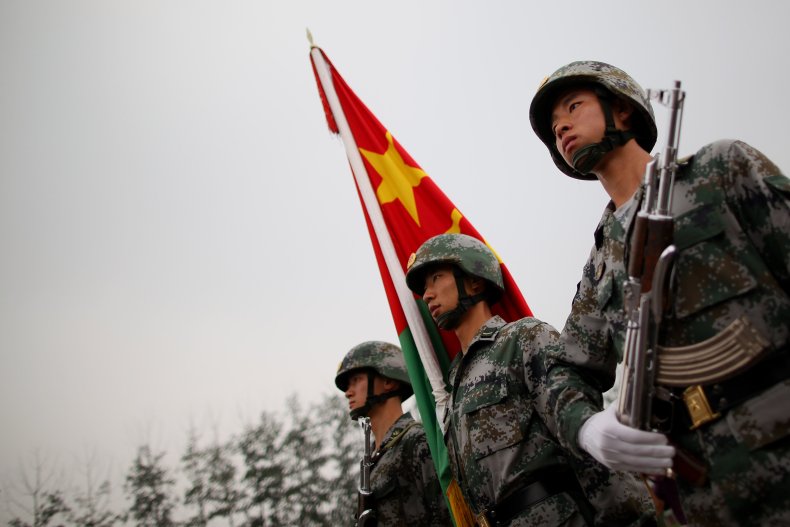THOMAS KIKA
The Chinese military has deployed long-range bomber planes to its border with India in a move to deter conflict between the two nations.
During the celebration of the People's Liberation Army (PLA) Air Force's 72nd anniversary last Thursday, state-run news channel China Central Television (CCTV) reportedly aired footage of H-6K bombers flying near the Himalayas. While typically based closer to Beijing, the jets were moved to Xinjiang province sometime last year, close to a region contested by China and India, the South China Morning Post reported.
These particular bombers are usually outfitted with CJ-20 long-range missiles for land and sea encounters. Speaking to the Post, military analyst Anthony Wong Tong said that positioning such bomber planes near the border is "definitely a warning to India."
"New Delhi is within the combat range of the H-6K and the striking range of the CJ-20," Tong explained.
 A Chinese state-run news channel reportedly aired footage last week of H-6K bombers flying near China's border with India. Above, China's People's Liberation Army soldiers demonstrate their skills in Beijing on July 28, 2009.FENG LI/GETTY IMAGES
A Chinese state-run news channel reportedly aired footage last week of H-6K bombers flying near China's border with India. Above, China's People's Liberation Army soldiers demonstrate their skills in Beijing on July 28, 2009.FENG LI/GETTY IMAGESBy contrast, Song Zhongping, another analyst and former PLA artillery instructor, said China would more likely be interested in targeting India's airbases in the region, as opposed to its capital city.
"China will not attack civilian areas," Song told the Post. "So Delhi will not be targeted by air-launched missiles even though the capital is quite close to the border."
In the footage aired on state-run television, it was noted that the bomber planes were outfitted with a different type of short-range missile, not the long-range ones they are designed for. Another analyst told the Post that this was deliberate.
"It's a careful warning from the PLA. The CCTV [report] deliberately did not include footage of the H-6K with powerful CJ-20," Zhou Chenming, a military science researcher, said. "China hopes the border conflicts will not escalate further, with the coronavirus pandemic expected to worsen this winter."
Tensions along China and India's disputed border have been simmering since October, when negotiations between the two nations' military leadership broke down. Since then, each side has blamed the other whenever dustups have broken out along the border.
The talks first began in May 2020 amid increasing conflict between both sides. These conflicts reached their height the following month, when roughly two dozen soldiers were killed in a confrontation in the Galwan Valley.
As the Indian government signed a military intelligence sharing deal with the U.S. last fall, Chinese media urged its neighbor to avoid going to war, noting that China would inevitably win such a conflict.
"War is always in the minds of some Indians, no matter how messy their domestic situation is," an article in China's Global Times, a state-run newspaper, said. "The national strength, including military might, of China far exceeds that of India's. Although India is a major power in political terms, it is bound to lose, should a war with China break out."
No comments:
Post a Comment